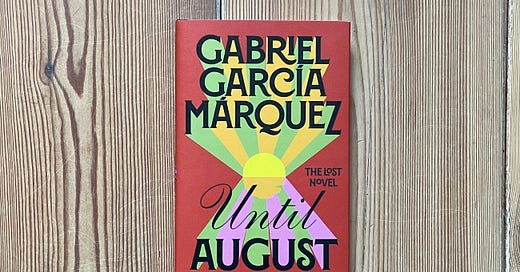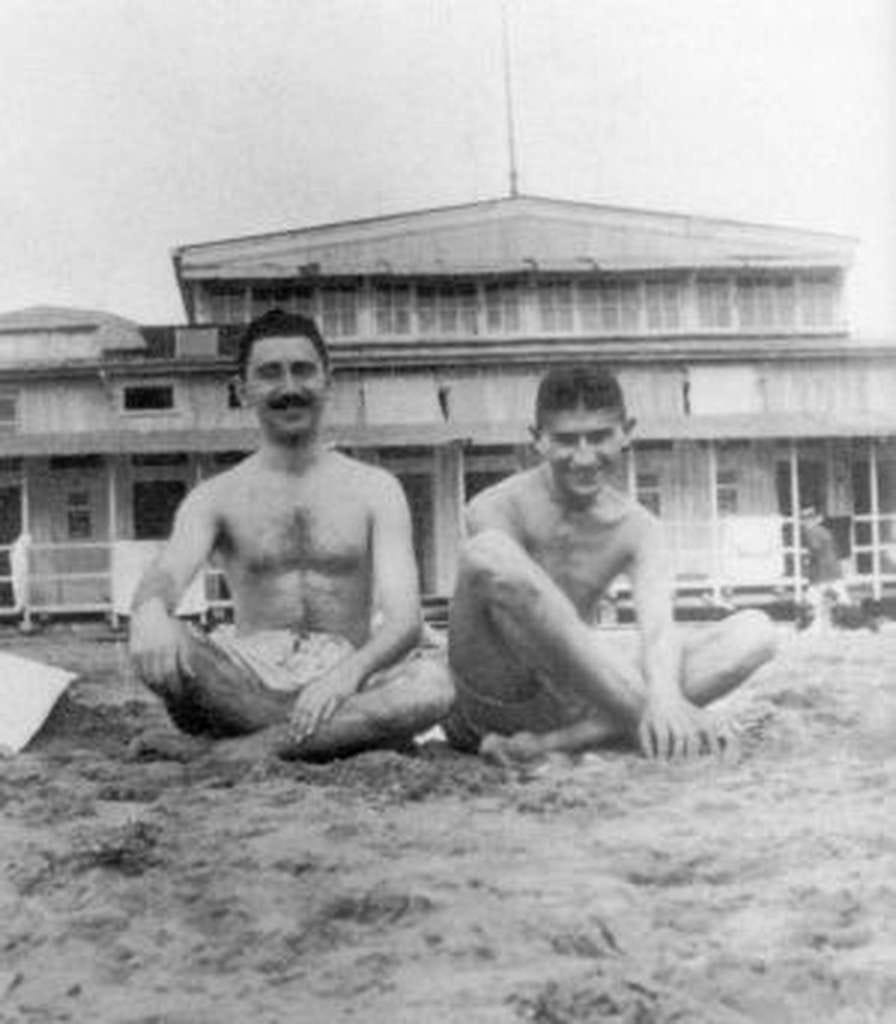On García Márquez's 'Lost' Novel and the Ethics of Disregarding an Author's Wishes
When an author passes away, the promise of new work dies with them. Those who live on know that this was it. The writer is gone and can no longer share their work with us, even if some publications might still emerge—intended to be revealed or not; in various stages of completion. From the perspective of the reader, the opportunity to read another work by a deceased favorite writer is a blessing. It is a beautiful kind of surplus forged from the writer's life. We are receiving more than we, perhaps, ought to.
Gabriel García Márquez's posthumous novel Until August (Spanish: En Agosto nos vemos) was published in March 2024. Having read all of Gabo's fiction, I was always going to order this book. The edition that I bought is pretty and colorful and has a marketing slogan on the cover: The Lost Novel. Now, I despise all forms of blurbs and slogans on books. As far as I'm concerned, there is absolutely no need for any text on a book other than the title and author on the front, and a short synopsis on the back.

I suppose that even marketing slogans come in degrees of tolerability. In this case, the allusion to the novel being 'lost' is willfully incorrect. The novel was never lost. Its development has been clearly charted and the manuscripts of different versions were never unavailable. Nor was the book even intended to be a novel. Gabo originally conceived of En Agosto nos vemos as a collection of five autonomous stories connected by the character of Ana Magdalena Bach—the only female protagonist in his oeuvre. He worked on these stories over the years, was encouraged by others to consider make a novel of the stories, and came up with several different versions ('Version 5' would eventually be published).
Suffering from dementia near the end of his life, Gabo was finally unable to sufficiently follow the plot of the novel, to see and carry through the connections between the stories or chapters and tie the work together. As a result, at the time of his death, the novel remained unfinished. He was apparently satisfied with the development of the protagonist, but not with the plot of the 'final' version of the novel. In fact, before his death, Gabo specifically requested that his sons destroy the novel. He told them: "This book doesn't work. It must be destroyed."[1]
His family initially respected García Márquez's wishes, but they later decided to publish the novel after all. In the preface (p. ix), his sons Rodrigo and Gonzalo García Barcha explain:
"Judging the book to be much better than we remembered it, another possibility occurred to us: that the fading faculties that kept him from finishing the book also kept him from realizing how good it was. In an act of betrayal, we decided to put his readers' pleasure ahead of all other considerations. If they are delighted, it's possible Gabo might forgive us. In that we trust."
This act of betrayal is reminiscent of perhaps the most famous case of disregarding an author's wishes to have their writing destroyed: Max Brod's defiance of Franz of Kafka. Kafka gave instructions in his will for his friend and literary executor Brod to destroy his unfinished works—including his novels The Trial, The Castle, and Amerika—yet Brod disregarded this and ultimately saw to the publication of much of Kafka's unfinished writing. Clearly, the world is a better place with the circulation of Kafka's novels. But how should we think about this? What, if anything, makes it acceptable to disregard an author's wishes for their writing not to be published? How should we think—feel—about this as readers?
On the one hand, one might argue that great art transcends the individual and ultimately belongs to humankind as a whole. From a utilitarian perspective, one may sometimes disregard the wishes of an artist and publish their work if, thereby, one stands to greatly increase the wellbeing of society. Imagine a world without Shakespeare, Fyodor Dostoevsky, or Jane Austen! Surely, any wish that these authors may have had for other not to publish their writing is trumped by its boundless socio-moral importance, its deep cultural significance. After all, we all take part in and shape our culture. Do we not get a say?
Although there is a certain kind of appeal to this line of reasoning, and even if I agree that great art exceeds the individual artist, it does not seem quite satisfactory. In the case of García Márquez, for instance, his significance as a writer does not hinge on the publication of Until August. There is an entire body of work that has already been influential through its unique artistic qualities. The preceding argument about the social value of art does not have anything particular to say about the acceptability of publishing this specific novel. We generally do not know the status of a specific work of art prior to its publication. How good is this novel—what are its merits and what will be its cultural significance? The value and status of art has to be determined retrospectively; it cannot be established in advance. Just because a writer is a great artist or has written magnificent books in the past, does not mean that any subsequent work will inevitably be great. It may well be a dud. It occasionally happens even to very great artists (Tolstoy's novel Resurrection comes to mind).
It cannot be the case that anything that we might call art is by virtue of that characterization out of the hands of its creator, as if suddenly divorced from that person's existence and desires regarding its fate. You do not have to agree with Albert Camus that a "work of art is a confession" (p. 4), but whatever the social significance of art might be, it is also always deeply personal. (If a work of art is truly a confession, we may have even less justification for listening to it against the confessor's wishes).
There may be very compelling personal reasons for an artist not to want to see something published. One may not feel satisfied with a work and may even come to loathe it. Certain kinds of literature may be so personal in nature as to make publication even more problematic, like personal diaries and letters. Thomas Mann's Joker remarks that there is "only one real misfortune: to forfeit one's own good opinion of oneself" (p. 58). In anticipation of death, a writer may still wish to keep a strict writing standard or maintain a good posthumous name. It would be strange to accept that, when the writer is gone, these wishes no longer matter.
Artists are not public workers, diligently producing their art for the public to consume as and when they please or for the social good per se. That is not how it works. It is not what we accept while artists are living. We do not force writers to publish their works—as much as, in eager anticipation, we may sometimes want to. Imagine that García Márquez were still alive. Would we have any claim to his novel? Would his sons? Clearly not. It would be up to the man himself whether or not he wanted to publish it. But perhaps, since he has died, the fact that he is no longer in possession of his manuscripts that means that he has lost ownership of his work?
This also does not seem like a compelling argument. Gabo might have placed the manuscript in someone else's possession during his lifetime while specifying that it should not be published (perhaps he intended it only for that person to read). Were that person nevertheless to publish the manuscript without Gabo's permission, I think we would all agree that this is wrong. It would be ethically and legally problematic. What, then, does a writer's death change?
I honestly do not know whether a writer's death changes anything. Metaphysically, a person's wishes are a person's wishes—if they are clearly and autonomously stated, with full information and not under duress, then they remain and stay valid even after death. Who am I—who is anyone—to decide to publish a writer's work against their stated wishes?
Yet, there are clearly cases where we lose something of immense value if we choose to honor a writer's directives against publication. In the end, I recognize both perspectives, and I think that we face a genuine ethical dilemma. Art transcends the individual and also sometimes, perhaps, their stated wishes—but this is never morally neutral and often comes at a great moral cost.
The upshot is that, as a reader, I am deeply ambivalent about reading books published explicitly against their authors' wishes. I am and remain uncomfortable with the idea, even if I do choose to read them. In concession, I do not rate these books, which were not meant neither for publication nor for public valuation—Kafka's diaries, Austen's letters, or Gabo's supposedly lost novel, and so on—on Goodreads. They cannot be judged in any straightforward or formulaic manner because they were never intended or prepared for publication.
I read such books with respect and reverence—even with a sense of contrition—beyond what is warranted by their substance. I read them hushed and apologetically, almost reluctant to bring them out in the open. Such books should not leave the home, the intimate space between closed doors, where the loving relationship between a reader and a writer allows the former to say to the latter, with a sigh and if only in spirit: "I am sorry, thank you."
References
Camus, Albert. 2010. Notebooks: 1935-1942. Chicago: Ivan R. Dee.
García Márquez, Gabriel. 2024. Until August. London: Penguin Viking.
Mann, Thomas. 1998. The Joker. In Death in Venice and Other Stories. New York: Vintage.
[1] As told by Rodrigo and Gonzalo García Barcha in the preface to Until August (García Márquez 2024, p. viii).




